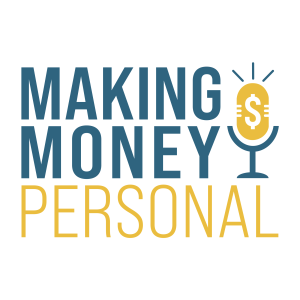Episodes

Tuesday Jun 10, 2025
5 Reasons to Vacation in an RV - Money Tip Tuesday
Tuesday Jun 10, 2025
Tuesday Jun 10, 2025
Craving freedom, flexibility, and a front-row seat to nature’s wonders? Whether you're chasing sunsets or seeking spontaneous detours, RV vacationing can save you hundreds on lodging and dining costs. Discover five compelling reasons why vacationing in an RV might just be the ultimate way to explore the open road.
Links:
View Bankrate's Summer Vacation Survey
Check out Triangle's competitive RV Rates and low-rate auto loans
Learn more about this Money Tip's sponsor: New England Royal Service
Check out TCU University for financial education tips and resources!
Follow us on Facebook, Instagram and Twitter!
Learn more about Triangle Credit Union
Transcript:
Welcome to Money Tip Tuesday from the Making Money Personal podcast.
Today’s Money Tip is proudly sponsored by New England Royal Service. A local NH business offering commercial cleaning and property maintenance trusted for its exceptional service. Visit neroyal.com to learn more and show us a little love by mentioning this podcast when you reach out!
Now back to today’s tip.
Summer is right around the corner which means you are probably planning your summer vacations with loved ones. Ditch the family vacation to the amusement parks this year and take the family on a road trip in a recreational vehicle or camper! Here are 5 reasons to vacation in an RV:
1. Cost-effective travel. According to Bankrate’s Summer Vacation Survey, 47% of Americans chose not to go on a summer vacation in 2024—65% citing affordability as the reason. One of the biggest vacation costs is transportation, which includes airfare, car rental, parking fees, gas, etc. Now factor in the cost of a hotel room and food on your vacation, and the costs really add up. When you vacation in an RV, your transportation and place to sleep are rolled into one which helps cut down on costs. Plus, RVs have small kitchen areas included to stock up on food staples before you begin your trip. Instead of eating out for every meal, you can cook some meals in your RV and lower your total vacation costs.
2. Flexibility. Gone are the days of booking a vacation based on the cheapest flights or hotels. RVs give you increased flexibility because when you are traveling and staying in your own mode of transportation, you are not locked down to specific dates and times for vacation.
There’s also flexibility if something occurs and you need to delay your vacation by a week. You don’t need to worry about changing flights or booking new accommodations because you are traveling in your own mode of transportation.
3. Bring Your Pets. Another pro of vacationing in an RV is being able to bring your pets along. Instead of asking your friends or family to take care of them, or even paying to have someone look after them, you can take them along as travel companions.
Not only is this a good choice for your finances, but it also provides peace of mind so you can spend your vacation relaxing instead of worrying about how your pets are doing without you.
4. Privacy and Comfort. Why would you want to squeeze into the middle seat of an airplane when an alternative is being able to stretch out in the sleeping area, sit in the dining area enjoying a meal or even using the private bathroom while traveling to your destination. When it comes to sleeping, you have the security of having your own space which can help you feel safer than an AirBnB when in an unfamiliar place. Plus, you can tow your own car behind your RV; that way if you want to explore each destination a little deeper, you can do so in your own car and can avoid a rental car.
5. Bring Home with You Wherever You Go. Another benefit of vacationing in an RV is bringing and using what is most familiar to you. We’ve all had a terrible night stay at a hotel while on vacation because the pillow just wasn’t right or the blanket was too rough. When you vacation in an RV, you can bring your own pillows and blankets (among other things) with you for those comforts of home. RVs provide more storage space as well which means you aren’t confined to just what you can pack in a suitcase. In addition to more clothes, shoes, and bedding, RVs offer the opportunity to bring other things you can use on your vacation. Maybe you have bicycles or kayaks that you want to use when exploring your new destination; if so, you can bring these along with you when you have the space in an RV!
If you’re ready to take the plunge and finance an RV or camper, check out Triangle Credit Union’s competitive rates. We also offer low auto rates on new purchases and vehicle refinancing!
If there are any other tips or topics you'd like us to cover, let us know at tcupodcast@trianglecu.org. Also, remember to like and follow our Making Money Personal Facebook and Instagram to share your thoughts. Finally, remember to look for Triangle Credit Union, on Facebook and LinkedIn.
Thanks for listening to today's Money Tip Tuesday. Check out our other tips and episodes on the Making Money Personal podcast.

Tuesday Jun 03, 2025
Buy Now, Regret Later? The Rise of Phantom Debt - Money Tip Tuesday
Tuesday Jun 03, 2025
Tuesday Jun 03, 2025
Buy Now Pay Later is a short-term loan that allows consumers to pay for their items in small installments over time. However, due to the popularity of Buy Now Pay Later, there has been an increase in what many have started to label “phantom debt”.
Links:
Learn more about this Money Tip's sponsor: New England Royal Service
Explore debt consolidation loan options from Triangle Credit Union
Watch our Financial Freedom webinar for tips on how to manage and get out of debt
Check out TCU University for financial education tips and resources!
Follow us on Facebook, Instagram and Twitter!
Learn more about Triangle Credit Union
Welcome to Money Tip Tuesday from the Making Money Personal podcast.
Today’s Money Tip is proudly sponsored by New England Royal Service. A local NH business offering commercial cleaning and property maintenance trusted for its exceptional service. Visit neroyal.com to learn more and show us a little love by mentioning this podcast when you reach out!
Now back to today’s tip.
The term phantom debt can mean multiple things. Traditionally, phantom debt is a debt that is too old to collect legally, so it’s either written off or sold to a collection agency. Phantom debt may also refer to when scammers try to collect money that is not owed to them by threatening legal action. However more recently, phantom debt has come to mean a debt that can’t be measured since it’s not reported.
According to many reports, Buy Now Pay Later is a large producer of these unmeasured phantom debts. Because of its convenience, consumers are finding it easier to use Buy Now Pay Later services to pay for larger items in smaller installments than paying for it all upfront. However, that means people are using Buy Now Pay Later to buy more big-ticket items than they can actually afford. This results in loan stacking, which is borrowing multiple loans at the same time. With more and more of these Buy Now Pay Later loans, it can be difficult for consumers to keep track of them. If you don’t pay these loans on time, you will get hit with late fees and your credit score will lower.
If you’re struggling with Buy Now Pay Later debt, aka “Phantom Debt”, there are a couple things that you can do. The first thing you can do is request a payment extension. Some Buy Now Pay Later lenders will let you either change or extend the payment due date which can provide some much-needed extra time pay off the debt. You could also apply for a debt consolidation personal loan, which would combine some or all of your debts into one single loan. This not only makes it easier to keep track of existing debt but it can even help improve your credit score as you make those regular, consistent payments to pay it all off on time.
If there are any other tips or topics you'd like us to cover, let us know at tcupodcast@trianglecu.org. Also, remember to like and follow our Making Money Personal Facebook and Instagram to share your thoughts. Finally, remember to look for Triangle Credit Union, on Facebook and LinkedIn.

Thursday May 29, 2025
Episode 82: Developing Your Inner Leader (Part 2) | Adriana Torres
Thursday May 29, 2025
Thursday May 29, 2025
Have you ever wondered what it takes to become a truly impactful leader? In this episode, we'll explore practical strategies for cultivating leadership skills that can transform both your personal life and your professional life. Join us as we discuss some actionable insights and a few stories to help you become a more effective and influential leader.
Links:
Leaders Eat Last by Simon Sinek
Dare to Lead by Brené Brown
Winning Leadership by Sherry Winn
Follow Adriana's Business on Facebook: The Process Reinvention LLC
Email Adriana: theleanidea@gmail.com
Check out TCU University for more financial education tips and resources!
Follow us on Facebook, Instagram and Twitter!
Learn more about Triangle Credit Union

Tuesday May 27, 2025
Strategies To Help Reduce Debt - Money Tip Tuesday
Tuesday May 27, 2025
Tuesday May 27, 2025
Struggling with debt can feel overwhelming, but with the right strategies, it's possible to regain control and build a more secure financial future. Fortunately, there are practical and proven methods to reduce and manage debt effectively, no matter your financial situation.
Links:
Check out NerdWallet's Top Budget Apps for 2025
Learn more about Triangle's personal loan options for debt consolidation
Financial webinars for Budgeting and Paying Off Debt
Check out TCU University for financial education tips and resources!
Follow us on Facebook, Instagram and Twitter!
Learn more about Triangle Credit Union
Transcript:
Welcome to Money Tip Tuesday from the Making Money Personal podcast.
Debt is a tool, and it can be very useful when used properly. Borrowing money can help us buy our first car, get into our first home, or even pursue that degree for our dream job. But like any tool, it's possible to get into trouble if we don't understand how to use it.
Taking action when debt becomes burdensome is essential. Recognizing the various signs can detect unmanaged debt, and this awareness can bring a sense of reassurance.
Unmanageable debt can reveal itself in some or all of the following ways: There’s no ability to save money because it’s all going to payments, you have a heightened sense of worry, stress, or anxiety over financials, and your debts aren't being paid on time and are heading towards or currently in collections.
Based on these factors, reducing debt to a manageable level is a net positive for your life. It's not just about the numbers; it's about the hope and freedom it can bring. Reducing debt not only improves financial health but may also improve mental health.
Pursuing and achieving financial freedom usually starts with some form of reducing debt and proper management is essential to get there. Once managed, you can push that throttle forward and speed rapidly toward finally getting it under control.
Here are three top strategies to reduce and manage debt effectively:
Simplify your payments by organizing and consolidating. Budgeting is a key part of this process. We often stress the importance of budgeting because it's the foundation of successful debt management. It's hard to plan without a budget, and your debt payoff effort won't be as effective. Educate yourself on successful budgeting tactics and find the one that works best. Whether it's pen and paper or a digital app, it is essential to keep your budget organized. You can also explore some of the top budgeting apps. For example, Nerdwallet published a list of the top budgeting apps for 2025, so check out the link in the show notes. Explore consolidation loans or other debt assistance programs. If debts are tough for you to manage, a debt consolidation might take that pressure off and give you the necessary breathing room. It enables you to group some or all your various debt bills into one consolidated payment that's easier to manage. For help, contact staff at your local bank or credit union. They could help illuminate the right options for your situation and cover the various details involving a debt consolidation.
Find a way to lower your bills. Cut back on spending if possible. Avoid unnecessary purchases and cancel unused subscriptions. You can also explore ways to refinance your debts, whether auto, personal, credit cards or student loans to a lower interest rate. By shopping around for lower rates, you may be able to decrease your monthly payment, freeing up more cash to put towards your existing debt. This can also be a significant saving over the life of the loan, making it a worthwhile strategy to consider. And you can lower bills by negotiating with providers and businesses for better rates or payments. Cell phone providers, car insurance companies, cable and internet providers, and even gym memberships will likely try to work with you on a better deal. If not, shop around and see if you can find that better deal elsewhere.
The third way to start managing debt better is to find ways to increase income. If you're currently working, consider asking for a raise, or even working overtime to bring in a little more each paycheck. Explore a new job for opportunities that might land you a better salary or consider picking a second job to work a few extra hours each week. Even working an extra 10 hours per week could provide the right amount of buffer in your budget to chip away at that big debt pile. If you need something more flexible to bring in more money consider gig work or freelance work on the side to bring in extra cash. You could try delivery or Uber driving, pet sitting, or dog walking, which are all popular ways to easily try out gig work. Also, don't forget about other opportunities like tutoring, graphic design, photography, or babysitting. If you decide to try this, remember to set aside a portion of your earnings for taxes.
If you need help getting started on your debt payoff plan, we offer webinars to watch on YouTube that cover a variety of budgeting tools and strategies as well as putting together a debt payoff plan tailored for your situation. Watch on demand using the links posted in the show notes.
If there are any other tips or topics you would like us to cover, let us know at tcupodcast@trianglecu.org. Like and follow our Making Money Personal FB and IG page and look for our sponsor, Triangle Credit Union on social media to share your thoughts.
Thanks for listening to today’s Money Tip Tuesday and check out our other tips and episodes on the Making Money Personal podcast.
Have a great day!

Tuesday May 20, 2025
Your Next Big Move: Condo or House? - Money Tip Tuesday
Tuesday May 20, 2025
Tuesday May 20, 2025
Figuring out where to live is a significant and costly decision everyone has to make at some point. If you want to purchase a property to make your home, condominiums, and houses are what you want to look at.
Each has pros and cons, and depending on your lifestyle, you may lean towards one over the other. Keep listening to learn which option is right for you.
Links:
Learn more about Triangle's mortgage products
Check out TCU University for financial education tips and resources!
Follow us on Facebook, Instagram and Twitter!
Learn more about Triangle Credit Union
Transcript:
Welcome to Money Tip Tuesday from the Making Money Personal podcast.
The main difference between a condominium and a house is that when you buy a house, you purchase the land and the building on it. With a condominium, or condo for short, you buy the unit and share the land with other condo owners.
Unlike apartments, you don't pay rent on houses and condos; you pay your mortgage and a condo HOA fee (more on that in a minute). However, some condos are available to rent if you prefer, but that means you won't build equity over time. When you buy a house or a condo and start paying your mortgage, you'll build up equity.
One compelling reason to consider a condo over a house is the pricing. Condos are typically more affordable, making them an attractive option for first-time buyers. A study by the National Association of Realtors found that the median price of detached single-family homes was $42,000 more than the median price of condos, a significant difference that could make homeownership more accessible.
However, condos usually have additional fees attached. Condos typically have a Homeowner Association, or HOA for short, which comes with fees. Some HOA fees include utility fees such as water, electricity, and more, which you would've had to pay anyway if you bought a house.
An advantage of condos over houses is that upkeep is a lot easier. Due to the HOA fees mentioned, someone will handle all the exterior maintenance, like lawn mowing, snow removal, and general outdoor upkeep. With a house, you'd have to do everything yourself or hire someone else.
While this has advantages, a condo may not be for you if you enjoy taking care of your lawn and garden and don't want to share it with your neighbors. Similarly, a condo is probably not the way to go if you value your space. With some condos, not only are you sharing your outdoor spaces, you might also be sharing walls. Many condos are attached so you will be very close to your neighbors. However, there are detached condos that aren't. Depending on your lifestyle, you might value this tight sense of community, or you might want your space away from others.
A downside to condos is you have less autonomy over what you can and can't do with your space. Some HOAs have stringent rules, such as how you can decorate the outside of your unit and what pets are allowed. While some neighborhoods where you buy a house might have an HOA, you typically are not restricted with what you can and can't do to your home.
Condos might also be harder to sell than houses, especially if the HOA is mismanaged. If you notice that many condos in the area are for sale, that might be a red flag that people are trying to leave this community.
There are upsides to condos in that the insurance is generally cheaper than buying a single-family home. This is because you are only responsible for the inside of your home, compared with having the land and house insured.
Which is the better choice for you, a house or a condo? The answer lies in your lifestyle and what you value most. A condo could be the perfect fit if you're looking for a more affordable option and don't want to worry about outdoor upkeep. On the other hand, if you value your personal space and prefer more autonomy, a house might be the better choice. It's all about finding the right balance that suits your needs and preferences.
Whatever you choose, if you're looking for a mortgage, Triangle Credit Union has got you covered. Triangle offers affordable mortgage solutions for whatever your situation might be. Visit trianglecu.org today so we can help you start on your housing journey.
If there are any other tips or topics you'd like us to cover, let us know at tcupodcast@trianglecu.org. Also, remember to like and follow our Making Money Personal Facebook and Instagram to share your thoughts. Finally, remember to look for our sponsor, Triangle Credit Union, on Facebook and LinkedIn.
Thanks for listening to today's Money Tip Tuesday. Check out our other tips and episodes on the Making Money Personal podcast.

Thursday May 15, 2025
Episode 82: Developing Your Inner Leader (Part 1) | Adriana Torres
Thursday May 15, 2025
Thursday May 15, 2025
What does it take to become a great leader? Leadership skills aren't only for high-ranking executives and key decision makers. They can be used by people in all stages of life and occupations, from teachers and household managers to small business owners and team leaders.
In this episode, we welcome back Adriana Torres, a dedicated SCORE volunteer and successful entrepreneur, to share her insights and some practical tips on how all of us can elevate our own leadership skills.
Links:
Leaders Eat Last by Simon Sinek
Dare to Lead by Brené Brown
Follow Adriana's Business on Facebook: The Process Reinvention LLC
Email Adriana: theleanidea@gmail.com
Check out TCU University for more financial education tips and resources!
Follow us on Facebook, Instagram and Twitter!
Learn more about Triangle Credit Union

Tuesday May 13, 2025
Tips to Protect Wealth During Economic Challenges - Money Tip Tuesday
Tuesday May 13, 2025
Tuesday May 13, 2025
Recession, crisis, tariffs, inflation—all these words circulating around the media and internet for the past few weeks have made many people uneasy and a little frightened about the future. Stories of an alarming nature are circulating daily, so if you're beginning to feel spooked, you're not alone.
Whether or not a real economic crisis will happen is hard to predict, but setting some safeguards for your financial future can give you some solid peace during turbulent times.
Links:
Set aside cash in a savings account for potential emergencies
Explore our many Financial Planning Services
Watch our Debt Reduction Webinar to learn how to put together your own debt reduction strategy
Check out TCU University for financial education tips and resources!
Follow us on Facebook, Instagram and Twitter!
Learn more about Triangle Credit Union
Transcript:
Welcome to Money Tip Tuesday from the Making Money Personal podcast.
If you've been following the news lately, you're likely hearing alarming messages warning of a looming recession, empty store shelves, economic uncertainty, and the possibility of a global financial crisis.
Many of our brains are wondering how likely we are to experience these challenges and, if so, when.
First and foremost, it's crucial to stay calm. Remember, news stories are often sensationalized for attention-grabbing headlines, with little substance behind them.
This doesn't mean that there might not be some financial challenges coming down the pike, but the good news is that, we can take specific, measurable steps to safeguard our finances for the possibility that something might occur.
If you're feeling uneasy about your financial future, here are a few ways to safeguard your finances during economic challenges and even recessions.
Save money. If economic uncertainty increases, the chances of job loss, price increases, and unplanned expenses go up. Having money set aside for those purposes is not just wise, it's a crucial step towards feeling secure and prepared. Having money saved in an emergency fund can also keep you from relying on credit or dipping into retirement if you need money. It's wise to have some saved in an account you can easily withdraw from, and to even have a portion of it as cash at home in case there are tech disruptions, or you don't have the time to get to a bank or ATM.
Work to pay down excessive debt. When it comes to economic uncertainty, crippling debt can be a liability. Many Americans carry a variety of debts, but if your debt has become burdensome to the point that it's causing stress, you owe it to yourself to do something about it. Those carrying crippling debt don’t have the freedom to adapt which proves so valuable during economically challenging times. To safeguard your financial health against economic challenges, it's important to start paying down your debt. Focus on an effective debt-reduction plan like the debt snowball or debt avalanche method. If you’re unsure where to start, check out our debt reduction webinar on our YouTube channel for a practical and easy-to-follow debt-reduction strategy. Don’t panic and feel that you have to be fully debt-free to weather an economic storm. Instead, focus on minimizing your debt to free up more income for your needs as they arise.
Review existing investment portfolios. If you're worried about future economic challenges, it's a good time to look at your current portfolio. The point of this isn’t to panic, but to determine whether it’s time to make strategic moves in the market. Doing this can provide reassurance and a stronger sense of control. Economic factors impact investment and retirement accounts, so at times situations may arise to make adjustments. For those unfamiliar with investing and markets, it's ideal to sit down with a professional who can review everything and provide a custom assessment regarding your portfolio. Financial planners with investing experience can be excellent guides because they've been watching markets, can see trends, and have a comprehensive understanding of the various factors at play within the economy. If you're interested, Triangle's financial planning services offer expert advice on making the right investment moves in a volatile market. Visit trianglecu.org to explore resources for investing and preparing for the future.
Cut back on expenses and practice frugality. When times get lean, making the most of what you have, and cutting back on spending can give you an advantage. Practicing this gives you control over your money and lifestyle in a way that can shield you against the many unexpected possibilities like unemployment and rising prices. Unemployment isn't always a result of challenging economic times, but if history is any teacher, the likelihood of layoffs increases. Positioning your finances to shield yourself against a potential job loss is essential. Along with having an emergency fund and working to pay down debt, mentioned earlier, it may be worthwhile trying to cut back on unnecessary expenses. Use more of what you have, cut back on purchasing things you don't need, and get creative by substituting the purchase of expensive items and activities with more inexpensive ones.
Look for ways to build skills to help with everyday life. Sometimes, with some vision and creativity, you can turn a misfortune into an opportunity. Building new skills may be able to help relieve the economic burden. This may be the time to learn skills that can assist with providing for daily needs. Activities like gardening when done effectively, can help reduce food costs, and skills like clothes making or mending can make your current clothes last longer plus cut down on the need to purchase new ones. You can also explore other skills like simple car repairs, simple plumbing, home repair, wood working, construction and more. Building skills in these areas could open doors for opportunities to help yourself and others in a time of need. Explore some resources like DIY books, YouTube channels, or online groups to get instructions and advice from experienced people covering all kinds of projects. Plus, becoming proficient in new skills can also open doors to potential future income streams that would help supplement your existing income.
In times of financial uncertainty, taking proactive steps to secure your financial situation can provide a sense of control and stability. By saving money, reducing debt, and reassessing investments, you can better prepare for potential challenges ahead. Remember, staying informed and making thoughtful decisions now can lead to a more secure financial future, no matter what comes your way.
If there are any other tips or topics you would like us to cover, let us know at tcupodcast@trianglecu.org. Like and follow our Making Money Personal FB and IG page and look for our sponsor, Triangle Credit Union on social media to share your thoughts.
Thanks for listening to today’s Money Tip Tuesday and check out our other tips and episodes on the Making Money Personal podcast.
Have a great day!

Tuesday May 06, 2025
Common Crypto Scams to Avoid - Money Tip Tuesday
Tuesday May 06, 2025
Tuesday May 06, 2025
With cryptocurrency's increasing popularity, it's crucial to be aware of the prevalence of crypto scams. Cryptocurrency is a digital currency that uses cryptography to secure transactions. However, the rise of crypto has also led to a surge in scams. It's important to stay alert to spot these scams and avoid falling victim to them.
Links:
Report any crypto scams you encounter to any or all of the agencies below:
https://www.fbi.gov/contact-us
https://reportfraud.ftc.gov/
https://www.cftc.gov/complaint
https://www.sec.gov/submit-tip-or-complaint/tips-complaints-resources/report-suspected-securities-fraud-or-wrongdoing
https://www.ic3.gov/Home/Index
Check out TCU University for financial education tips and resources!
Follow us on Facebook, Instagram and Twitter!
Learn more about Triangle Credit Union
Transcript:
Welcome to Money Tip Tuesday from the Making Money Personal podcast.
One important thing to note about cryptocurrency is the U.S. government does not back it. If your crypto account gets hacked or the company that provides storage for your wallet goes out of business, your money is gone. The government has no obligation to step in and help you get your money back. In comparison, U.S. dollars deposited into an FDIC or NCUA-insured account are safe. Those coverages insure deposits up to $250,000 in the event of a financial institution failure.
That said, it's important not to fall for a cryptocurrency scam. Here are some common scams and their warning signs. First, suppose someone you're considering doing business with only accepts cryptocurrency payments. That should be a red flag, especially if the company demands that you send the payment before receiving any product or service.
A common crypto scam is an investment scam. If someone asks you to invest in a new crypto coin that guarantees quick and significant returns, it's most likely a scam. Crypto investment scams can come in many forms. A scammer might pose as an investment manager promising to make you rich if you buy cryptocurrency and transfer it to their account. They might even create a fake website to trick you further. It's also known that scammers have tried to impersonate celebrities, offering to multiply any cryptocurrency you send them. Scammers will also go on dating apps to find their targets. They might seem interested in you, but it's a red flag if they start talking about crypto and try to get you to invest with them.
Rug pull scams are also very common with cryptocurrency. Rug pull scams are when investment scammers pump up a new NFT or coin to raise funds. Once they get the money that people invested, they disappear. The way these "investments" are coded prevents people from being able to sell or trade them, making them effectively worthless.
Another crypto scam is when fraudsters impersonate a business or the government. They might say they're from Amazon, EZ-Pass, or even your financial institution and claim that there's fraud on your account or your money is at risk. They'll say that to fix the issue, you have to send them crypto. Don't click links or respond to their messages; it is a scam.
One last crypto scam is blackmail. Scammers might contact you saying that they have compromising photos, videos, audio, or information about you. If you don't send them crypto, they'll send it all to your friends, family, place of work, and school. Don't do it and report it to the FBI immediately.
If you encounter a crypto scam, there are a few things you should and shouldn't do. First of all, don't engage with the scammer. Many of these scams are mass messages that the scammer sends out and are not explicitly targeted at you. Responding to the scammer lets them know you exist and can be targeted for their scam. What you should do is ignore the message. You can also report the fraud to multiple places, including the Federal Trade Commission, the Commodity Futures Trading Commission, the U.S. Securities and Exchange Commission, the Internet Crime Complaint Center, and the cryptocurrency exchange company you encountered the scam on. Links to all of these resources will be available in the show notes.
If there are any other tips or topics you'd like us to cover, let us know at tcupodcast@trianglecu.org. Also, remember to like and follow our Making Money Personal Facebook and Instagram to share your thoughts. Finally, remember to look for our sponsor, Triangle Credit Union, on Facebook and LinkedIn.
Thanks for listening to today's Money Tip Tuesday. Check out our other tips and episodes on the Making Money Personal podcast.

Tuesday Apr 29, 2025
Top Benefits of Using Personal Finance Apps - Money Tip Tuesday
Tuesday Apr 29, 2025
Tuesday Apr 29, 2025
Managing personal finances can be daunting in today's fast-paced world. However, with the emergence of personal finance apps, individuals now have powerful tools to simplify and enhance their financial management. These apps transform financial habits and empower users to take control of their overall financial health. This tip will delve into the top benefits of using personal finance apps, shedding light on how they can put you in the driver's seat of your financial journey.
Links:
Explore the benefits of Triangle's mobile app and online banking services with TCUGo
Check out the useful benefits of personal finance tools like Goal Builder and Money Management
Check out TCU University for financial education tips and resources!
Follow us on Facebook, Instagram and Twitter!
Learn more about Triangle Credit Union
Transcript:
Welcome to Money Tip Tuesday from the Making Money Personal Podcast.
Personal finance apps continue to rise in popularity as people grow more digitally savvy and tech expands in processing and functionality. Using a personal finance app can significantly improve your financial game by helping you overcome challenges, get organized, and stay on track to meet goals. A report from Future Data Stats states that 70% of users improved their financial habits and budgeting skills when they used a personal finance app.
The key to achieving financial independence is to build the skills of managing personal finances effectively. The hard part for many is determining where to start. That's where personal finance apps and tools come in. They provide a sophisticated, user-friendly way to conveniently set up and manage finances. If you're not currently using a personal finance app or tool, consider using one. Here are a few top benefits of using a personal finance app.
The first benefit is that personal finance apps allow users to manage their finances anytime, anywhere. It's hard to beat the convenience and flexibility of on-the-go financial management. They keep all your information within arm's reach and provide functions and tools like access to real-time financial data and integration with bank accounts and credit cards for seamless tracking. Explore your app store for common, highly rated apps to try out. Also, consider exploring your financial institution's mobile app, which provides many of the same tools at no added cost.
The second benefit is that these apps offer robust tools for budgeting and tracking expenses. Although some might still prefer using pen and paper, for most people today, this method is waning. Personal finance apps provide budgeting tools with the latest technology and sometimes even AI capabilities to keep you on track with budgeting and tracking expenses. They provide ways for you to categorize spending to help identify patterns and areas for improvement, they offer alerts and reminders for upcoming bills and due payments, and they can provide you with deeper insights into your spending habits to help you stay within your budget.
A third benefit is that personal finance apps can significantly enhance financial security and instill user confidence. Storing your banking information digitally, especially when linked to different platforms, can concern many. However, reputable apps have robust security measures to protect your personal information. These apps use encryption and other security measures to protect your financial data.
To sum up, to successfully accomplish financial goals, you need to build effective money management skills, and using a personal finance app is a great way to get started.
When it comes to financial management, choosing the right app based on your needs is critical. Explore your app store for different options, read reviews, and look through functionality to determine the best app for you. If you're a Triangle member, consider exploring the various tools within your online and mobile banking account, like Money Manager and Goal Builder, to organize budgets, pay down debt, and set savings goals.
If there are any other tips or topics you would like us to cover, let us know at tcupodcast@trianglecu.org. Like and follow our Making Money Personal FB and IG page and look for our sponsor, Triangle Credit Union on social media to share your thoughts.
Thanks for listening to today’s Money Tip Tuesday and be sure to check out our other tips and episodes on the Making Money Personal podcast.
Have a great day!

Thursday Apr 24, 2025
Thursday Apr 24, 2025
Insurance is a common expense for many people but understanding the ins and outs of coverage can be challenging. In this episode, we delve into the vital role of the New Hampshire Insurance Department in safeguarding your personal and financial well-being.
Join us as Deputy Insurance Commissioner Keith Nyhan shares insights on common insurance issues essential coverage tips and the many resources available to help you navigate the complexities of insurance.
Links:
For insurance information or assistance contact the Consumer Services Hotline at 800-852-3416
Contact the NH Insurance department at: consumerservices@ins.nh.gov
Learn more about insurance assistance and help at: insurance.nh.gov
Explore video resources on the NH Insurance Department YouTube channel
To find a local insurance agent visit Big I NH at biginh.com, or call 603-224-3965
Check out TCU University for financial education tips and resources!
Follow us on Facebook, Instagram and Twitter!
Learn more about Triangle Credit Union

Financial Lessons & Tips
Join us for fun, relevant financial topics that provide you with resources to help you make financial decisions. The Making Money Personal Podcast talks about the impact that money has on your personal and professional life. Our podcast examines trends and topics with support from industry professionals.





